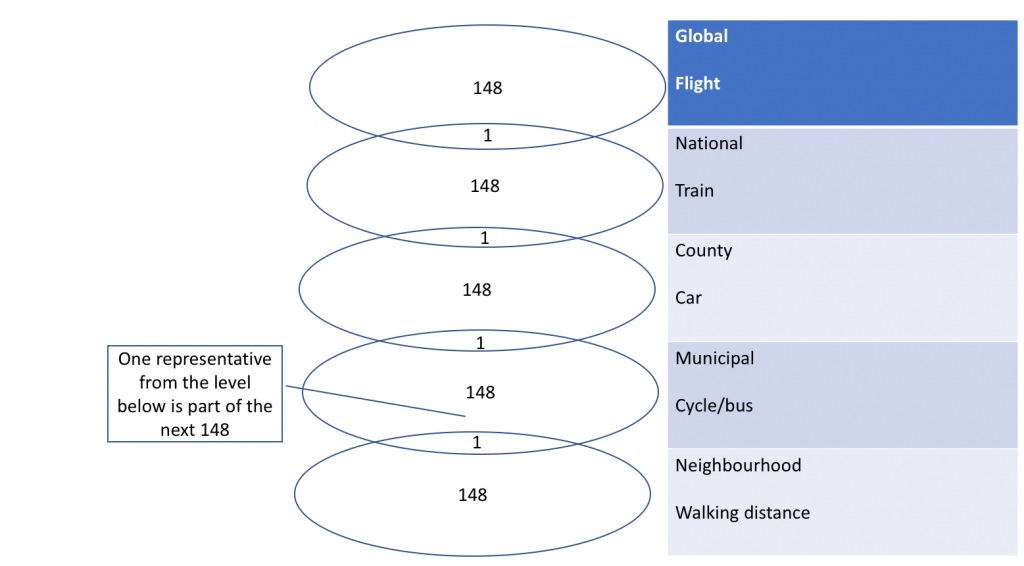Here follows an excerpt from a coming novel with the working title “Common man” which is a novel about a journalist who sets out to come up with an alternative form of world governance. The novel is a product of imagestreaming, a technique of invention and creativity developed in the 80s by Dr. Win Wenger. For more information about imagestreaming, and about other imagestreamed novels and stories, visit this link. If you’d like to be kept up to date as new chapters get published, sign up using the form in the right-hand column. More chapters are here.
I was told in the last imagestream to spread the word about the Dunbar number. I had met it before, but never seen it as useful for a model of political representation. I went back over the first transcript of that imagestream and found the phrase ‘the lecturer had drawn the Dunbar circles at the side of the whiteboard’. I took out powerpoint and started experimenting and came up with the following:

As often happens with imagestreams, I get something I do not fully grasp the mathematics of and have to put it into a spreadsheet and test it backwards and forwards. Anyway, seeing it as good enough for now and safe enough to try I published it on an article platform on the Internet
Can the Dunbar number ensure we take care of the Earth as our common heritage?
Max Wahlter
As I write this, COP 25 is going on. Children activists interviewed on stage, including Greta Thunberg, are stating simply that they represent the younger generation who want a chance to be able to live on the Earth in future and they see no action that is going to offer them more than a 50% chance of an inhabitable planet. No change since their last COP, only increasing CO2 levels. They, like most people cannot understand why they, their needs and the voices of scientists and ordinary people have no agency. Maybe there is way … building on insights from chimps.
Perhaps our world government arrangement has got out of hand and we have dimensioned it wrong. British anthropologist Robin Dunbar, back in the 1990s, proposed that there is a maximum number of people -148 -with whom we can maintain stable social relationships. In these an individual knows who each person is and how each person relates to every other person.
He arrived at this number by researching chimp communities and size of brain. Proponents say that larger numbers require an administrative burden of rules, laws, enforced norms etc to maintain a stable, cohesive group.
We need something that connects us all. This comprises at least the living layer that we all live on – water, air, all species of life. It COULD encompass even the mineral endowment and the fossil endowment so you could say we should all share it even if a load happens to be in one particular country. Something which we all share, all steward and get benefit from is a global commons. We could add technology, knowledge, language etc, to that list. We could envision a world where all are responsible and benefitting from the global commons.
Applied to the question of agency it suggests that political constellations – groups who have responsibility downwards and upwards to others – should have no more than 148 representatives in them. Each of the 148 have worked closely to understand the 148 they represent, and work with the 147 others to bring the best possible result and one of the 148 takes that upward to the next constellation. Less burden, better representation and decision.
But would it work on this Earth? Decide for yourself as I take you through the maths, but the way it looks to me is that each individual on Earth would only be four people away from influencing a decision at global level.
| 8 billion inhabitants /148 | Levels |
| =148 “Countries” or States of 54 million inhabitants each | 4 |
| Each State will have 148 Counties | 3 |
| Each County will have 360 000 inhabitants and 148 municipalities | 2 |
| Each municipality will have 2 500 inhabitants and 17 voting precincts | 1 |
| Each voting precinct will comprise 148 individuals of voting age |

What do you say- would this be better? We could retain our present country borders and have large countries like India break into States and have small countries like Sweden and Norway form regional alliances with neighbouring countries to reach the 54 million needed – about 5-6 countries maybe.
We would at least know our local political representative and know that he or she was just a few people away from the 148 at global level. I don’t know, hit me with a comment below. Might be a fun discussion!
Leave a Reply